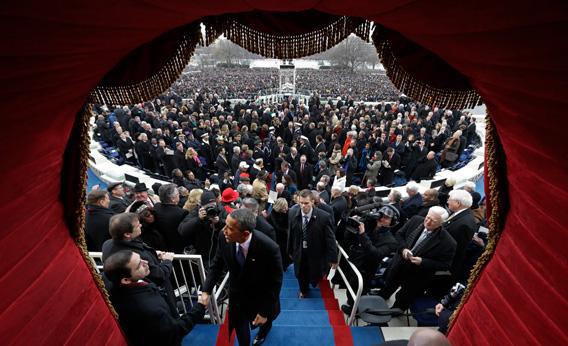When you are on the Fox News’ ticker for the wrong reasons, it’s time to put things into context.
On the eve of the president’s inauguration, I wrote a piece about what President Obama needs to do to be a transformational rather than caretaker president. I was using a very specific definition of transformational presidencies based on my reading of a theory of political science and the president’s own words about transformational presidencies from the 2008 campaign. It was also based on these givens: The president is ambitious, has picked politically controversial goals, has little time to operate before he is dubbed a lame-duck president, and has written off working with Republicans. “Bloodier-minded when it comes to beating Republicans,” is how Jodi Kantor put it in the New York Times. Given these facts, there is only one logical conclusion for a president who wants to transform American politics: He must take on Republicans—aggressively.
For me, this was a math problem with an unmistakable conclusion. Some people thought I was giving the president my personal advice. No. My goal was to make a compelling argument based on the facts. I used words like “war” and “pulverize,” and some have responded with threats to me and my family. (“Go for his throat!” some have counseled, echoing the headline.) These words have also liberated some correspondents (USUALLY THE ONES THAT TYPE IN ALL CAPS!!!!) from reading the piece or reading it in the spirit in which it was written. But there were also almost 2,000 other words in the piece, which should put that provocative language in context. What’s been lost in the news ticker and Twitter threats is the argument of the piece: This is the only plausible path for a bold, game-changing second term for a president who has positioned himself the way President Obama has. Indeed, the piece accurately anticipated the forceful line the president ultimately took in his inaugural address with his call for collective action and failure to reach out to Republicans. Brit Hume said Obama’s speech confirms for all time the president’s essential liberalism. The New Republic’s Noam Scheiber precisely identified the speech not merely as liberal but an argument for liberalism.
Some correspondents have asked why I didn’t advocate that Obama embrace House GOP spending plans or some other immediate compromise, a more pleasant outcome than the prospect of even more conflict in Washington. There’s no evidence, however, that the president is in a compromising mood. (Again, see second inaugural.) This piece was written from the viewpoint of the reality as it stands, not a more pleasing future we would all prefer to inhabit. That reality (and the initial piece) includes an unpleasant fact to some Republicans: The GOP is in a state of disequilibrium. For evidence of that disarray, I rely on Rep. Tom Cole, Sen. Rand Paul, participants at the House GOP retreat, and Ramesh Ponnuru at the National Review. (As I mentioned in the piece, Democrats have their own tensions, too.)
People see my article as an argument for one-party power, which is impossible since I posit that Obama’s second-term conflict with the GOP will be the first step leading to its rebirth as a majority party. Some assume I hate Republicans. This latter charge will confuse my close relations, who are not only proud conservatives but among Fox News’ most ardent fans (the two groups not necessarily overlapping). Indeed, one of the many reactions I received on my reporting on the tensions within the Republican Party came from a family member who wrote: “Barack Obama is the best thing ever for those who believe in conservative principles because it would show that with hard work, regardless of race, anyone can achieve, and it would give Republicans a few years in the wilderness to get back to a coherent philosophy. Now I believe that Obama will help conservatives because he will make them better. He has totally figured out how to use technology to deliver mass customized messages to individual voters and now citizens. Ultimately, this is a great boon to democracy. He is smart and articulate. He is tough and ruthless. All of this will make conservatives and Republicans raise their game. Ultimately, that is good. … I look forward to a Republican Party that is a worthy adversary and a worthy advocate. Barack Obama should inspire us conservatives to be better, not to be whinier.”
You can disagree with that analysis, but it is in keeping with the theory of political transformation that I was articulating as I considered the central question on the eve of Obama’s second term: What is the pathway for transforming American politics given the president’s current posture? There may be another way to solve this math problem, but I still don’t see it.
